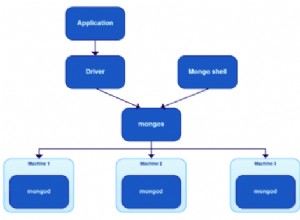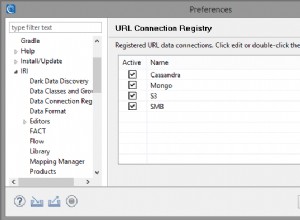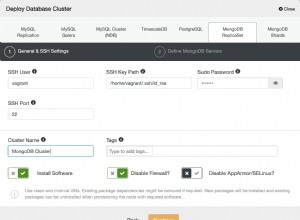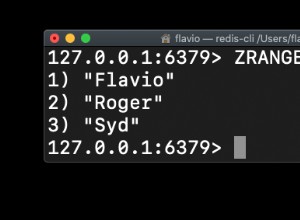Forse del codice, anche alcune correzioni al tuo approccio. Vorresti un tipo di join "manyToMany" che puoi fare come segue:
var async = require("async"),
mongoose = require("mongoose"),
Schema = mongoose.Schema;
mongoose.connect('mongodb://localhost/user');
var userSchema = new Schema({
email: String,
displayName: String,
subscriptions: [{ type: Schema.Types.ObjectId, ref: 'UserShow' }]
});
userShows = new Schema({
show: { type: Schema.Types.ObjectId, Ref: 'Show' },
favorite: { type: Boolean, default: false }
});
var showSchema = new Schema({
title: String,
overview: String,
subscribers: [{ type: Schema.Types.ObjectId, ref: 'User' }],
episodes: [{
title: String,
firstAired: Date
}]
});
var User = mongoose.model('User', userSchema);
var Show = mongoose.model('Show', showSchema);
var UserShow = mongoose.model('UserShow', userShows);
var user = new User({
email: 'example@sqldat.com',
displayName: 'bill'
});
user.save(function(err,user) {
var show = new Show({
title: "Some Show",
overview: "A show about some stuff."
});
show.subscribers.push( user._id );
show.save(function(err,show) {
var userShow = new UserShow({ show: show._id });
user.subscriptions.push( userShow._id );
userShow.save(function(err,userShow) {
user.save(function(err,user) {
console.log( "done" );
User.findOne({ displayName: "bill" })
.populate("subscriptions").exec(function(err,user) {
async.forEach(user.subscriptions,function(subscription,callback) {
Show.populate(
subscription,
{ path: "show" },
function(err,output) {
if (err) throw err;
callback();
});
},function(err) {
console.log( JSON.stringify( user, undefined, 4) );
});
});
});
});
});
});
Questo dovrebbe mostrare una risposta popolata molto simile a questa:
{
"_id": "53a7b8e60462281231f2aa18",
"email": "example@sqldat.com",
"displayName": "bill",
"__v": 1,
"subscriptions": [
{
"_id": "53a7b8e60462281231f2aa1a",
"show": {
"_id": "53a7b8e60462281231f2aa19",
"title": "Some Show",
"overview": "A show about some stuff.",
"__v": 0,
"episodes": [],
"subscribers": [
"53a7b8e60462281231f2aa18"
]
},
"__v": 0,
"favorite": false
}
]
}
O anche senza il "manyToMany" funziona. Nota qui che non c'è una chiamata iniziale da compilare:
var async = require("async"),
mongoose = require("mongoose"),
Schema = mongoose.Schema;
mongoose.connect('mongodb://localhost/user');
var userSchema = new Schema({
email: String,
displayName: String,
subscriptions: [{
show: {type: Schema.Types.ObjectId, ref: 'UserShow' },
favorite: { type: Boolean, default: false }
}]
});
var showSchema = new Schema({
title: String,
overview: String,
subscribers: [{ type: Schema.Types.ObjectId, ref: 'User' }],
episodes: [{
title: String,
firstAired: Date
}]
});
var User = mongoose.model('User', userSchema);
var Show = mongoose.model('Show', showSchema);
var user = new User({
email: 'example@sqldat.com',
displayName: 'bill'
});
user.save(function(err,user) {
var show = new Show({
title: "Some Show",
overview: "A show about some stuff."
});
show.subscribers.push( user._id );
show.save(function(err,show) {
user.subscriptions.push({ show: show._id });
user.save(function(err,user) {
console.log( "done" );
User.findOne({ displayName: "bill" }).exec(function(err,user) {
async.forEach(user.subscriptions,function(subscription,callback) {
Show.populate(
subscription,
{ path: "show" },
function(err,output) {
if (err) throw err;
callback();
});
},function(err) {
console.log( JSON.stringify( user, undefined, 4) );
});
});
});
});
});




